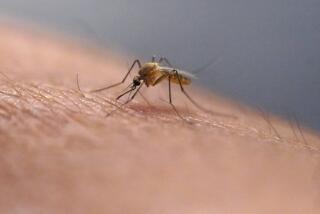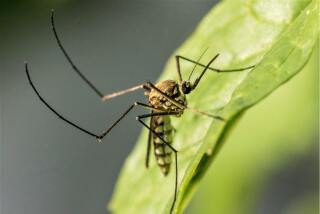EV-D68: Easy steps you can take to avoid spreading enterovirus infection
Parents should use common sense -- and a healthy dose of soap and water -- to prevent serious illnesses from the respiratory virus recently detected in California, experts said this week.
Enterovirus D68 infection has now been confirmed in four children in the state and is expected to appear in more, said state epidemiologist Dr. Gil Chavez.
There is no vaccine to prevent the infection, he said -- and in many cases, infected people will never know they have the virus.
Enteroviruses are often asymptomatic or cause only mild illnesses similar to a cold.
But the serious EV-D68 cases that worry doctors are essentially bad colds that settle in the chest, restricting airways and causing wheezing and breathing difficulty, said Ventura County public health officer Dr. Robert Levin. Children with asthma are particularly vulnerable to severe symptoms because their lungs are more sensitive, he said.
To slow transmission of this enterovirus and others, the California Department of Public Health recommends, Californians should:
- Wash hands frequently -- for at least 20 seconds, with soap and water.
- Avoid touching eyes, nose and mouth with unwashed hands or sharing utensils or cups or kissing and hugging people who are sick.
- Keep children home from school if they have active symptoms of an infection.
Parents with children who have asthma should take extra steps to prepare, said Chavez, making sure their kids are taking asthma medications regularly and keeping a close eye on cold symptoms like coughing and sneezing.
“If an asthmatic child develops an infection, make sure the infections don’t linger and worsen,” he said, adding that children without asthma who develop severe symptoms like wheezing or breathing difficulties should also go to the doctor.
Parents should not wait for their child to develop a fever if serious symptoms are present, Chavez said. Patients developed a fever in only 7 out of 30 cases described in this U.S. Centers for Disease Control and Prevention report on recent EV-D68 outbreaks in Illinois and Missouri.
The California cases reported this week ranged in age from 2 to 13 years and came from San Diego and Ventura counties. All were hospitalized for breathing troubles but have been discharged and are recovering well, Chavez said.
Around the country, according to a CDC count last updated Thursday, another 153 people in 18 states are known to have been seriously sickened by the virus.
For more on healthcare, follow me on Twitter: @LATerynbrown
More to Read
Sign up for Essential California
The most important California stories and recommendations in your inbox every morning.
You may occasionally receive promotional content from the Los Angeles Times.










